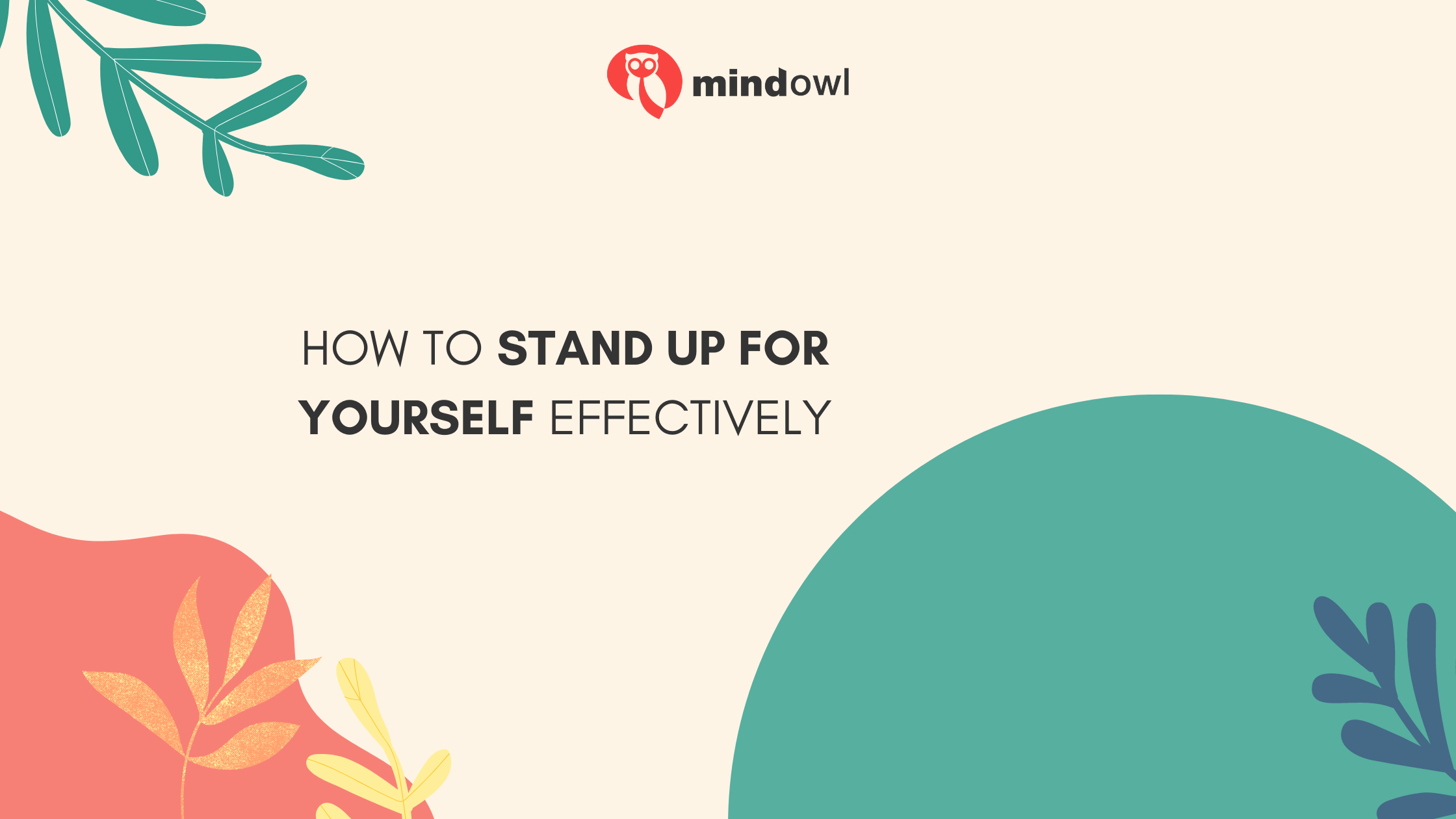Have you ever felt like people walk all over you? You’re not alone. Many of us struggle to stand up for ourselves in different areas of our lives. Whether it’s a bully at school, a demanding boss, or an overbearing family member, standing your ground can feel impossible.
Here’s an interesting fact: standing up for yourself isn’t just about confrontation. It’s also about believing in your own worth and respecting yourself. Our article will show how to assert yourself without crossing into aggression.
We’ll provide practical steps for expressing your needs clearly and calmly — whether that’s with colleagues at work or loved ones at home.
Get ready to empower yourself!
Key Takeaways
- Standing up for yourself is a sign of self-respect and shows you know your worth. It turns out, that being assertive can make both you and your relationships stronger.
- Expressing what you need clearly and calmly helps avoid confusion. Whether it’s at work or with family, telling people how you feel in a straightforward way builds trust.
- Knowing the difference between being assertive and aggressive is key. Being assertive means respecting others while making sure they respect you too.
- It might be scary to stand up for yourself at first, but like riding a bike, it gets easier the more you do it. Start with small steps, and soon enough, speaking up will come naturally.
- Real-life examples show that whether dealing with unfair tasks at work or setting boundaries at home, asserting yourself pays off. You gain confidence each time you speak up for what’s right.
Understanding the Importance of Standing Up for Yourself
Standing up for yourself shows you value your well-being and rights. It’s not just about saying no or setting boundaries; it’s a deep form of self-respect. This act tells others that you know your worth and won’t let them take away your voice.
People learn how to treat us based on what we allow. If we go with the flow too often, they might think it’s okay to overlook our needs.
Asserting yourself boosts confidence and improves relationships. It helps avoid feelings of resentment by making sure your needs are heard and met. Learning this skill takes time but brings great rewards in personal growth and mental health.
Being assertive without being aggressive opens doors to better communication and respect from others, making every aspect of life more fulfilling.

Techniques to Effectively Stand Up for Yourself
Being Transparent and Authentic
Being transparent and authentic means you share your real thoughts and feelings. You do this to stand up for yourself. It might feel scary at first. Yet, over time, it will make you stronger.
This openness allows others to see the true you. Sometimes, people might not like what they hear. But that’s part of being brave and honest.
Practice helps in becoming more straightforward about what bothers you or makes you happy at work or home. Use clear language when talking about your boundaries or needs with others.
This honesty builds trust in relationships and shows confidence in who you are.
Handling Confrontation Calmly
Dealing with confrontation calmly is all about keeping your cool. It’s key to show you’re in control, even when things get heated. You need to stand your ground but do so respectfully.
Use a steady voice and choose your words carefully. This shows others you mean what you say without making them feel attacked.
Practise makes perfect here—start with small issues before tackling the big ones. Keep eye contact to show confidence but not aggression. And remember, it’s okay to take a moment if you need it.
Stepping back can give everyone time to breathe and might just prevent things from escalating further.
Assertiveness vs Aggressiveness
Assertiveness and aggressiveness might seem similar at first glance. Both ways show you’re not backing down. Yet, there’s a big difference in how they impact your relationships and self-respect. Let’s break it down in a table so you can see the contrasts more clearly.
| Aspect | Assertiveness | Aggressiveness |
|---|---|---|
| Definition | Expressing your needs, desires, and opinions in a direct, honest, and appropriate way. | Pushing your needs, desires, and opinions in a forceful, hostile, or inappropriate manner. |
| Goal | To communicate clearly and stand up for oneself while also respecting others. | To win or dominate, often at the expense of others. |
| Impact on Relationships | Builds respect and trust. Strengthens connections. | Weakens trust. Leads to resentment and distancing. |
| Communication Style | Clear, direct, and uses “I” statements to own their feelings and thoughts. | Often uses blaming language, may involve yelling or interrupting. |
| Effect on Self | Increases self-esteem and respect. Empowers the individual. | May provide a temporary sense of power but ultimately harms self-respect and leads to guilt. |
| Examples | “I feel upset when I’m interrupted because I lose my train of thought. Please let me finish before responding.” | “You never let me speak! You’re always interrupting me!” |
Understanding these differences is key. Assertiveness places you on a path of mutual respect and self-growth. It’s about balance—neither passive nor overly forceful. Aggressiveness, on the other hand, might get you heard in the short term, but it damages relationships and self-respect in the long run.
Finding your voice through assertiveness empowers you and enriches your relationships. It’s a skill worth honing for everyone looking to navigate life confidently and respectfully.

Overcoming Challenges in Asserting Yourself
Finding out why standing up for yourself feels hard is a big step. Maybe past events make you shy away, or perhaps you worry about hurting others’ feelings. Learning to push past these fears takes time and practice.
Start small by saying no to something minor, and gradually work your way up. It’s like learning to ride a bike – shaky at first but smoother with more tries.
Sometimes, you might feel guilty or worry about rejection after being assertive. Remember, setting boundaries is healthy and necessary for all good relationships, be they at work or with friends.
Keep trying even if it doesn’t go perfectly every time. Each attempt builds confidence and helps you understand that your needs are important too. With each step forward, dealing with discomfort becomes easier, letting kindness lead the way without letting people take advantage of you.
Real-life Scenarios of Asserting Yourself
Asserting yourself can sometimes feel like a big hill to climb. It takes guts and practice, but once you get the hang of it, it’s like mastering any new skill. Here are some ways real people have put their foot down and stood up for themselves.
- At work, Alex had a co-worker who always passed off his tasks to others. Alex decided to be direct and set clear boundaries. He told the co-worker calmly but firmly that while he was happy to help out occasionally, it wasn’t fair to expect him to do these jobs regularly. This opened up a conversation about workload balance in their team.
- Sam felt her ideas were often overlooked in meetings. Next time, she made sure to speak up confidently and used strong body language to show she believed in what she was saying. People listened, and her ideas were taken more seriously.
- Jamie found herself doing all the housework while her partner relaxed. She expressed how this made her feel undervalued and suggested they create a more equal cleaning schedule together. This ensured both parties shared responsibilities fairly.
- Priya noticed a friend made backhanded compliments that hurt her feelings. Instead of letting it slide, Priya addressed the issue directly after taking a moment to compose herself. She explained how those comments made her feel without accusing or blaming her friend, leading to a deeper understanding between them.
- Marcus was being charged for services he didn’t use at his gymnasium membership during lockdown periods when he couldn’t attend because of regulations.. He wrote an email outlining his situation and clearly stated why he believed adjustments should be made to his billing.. The manager acknowledged his valid point and offered credit for the missed months.
- In school, Leah felt pressure from peers to participate in activities she wasn’t comfortable with.. She paused,, took a deep breath,, and politely declined,, suggesting something else they could do instead that everyone would enjoy..
- Emma saw someone leave trash on the train seat beside them as they got off.. Feeling enough was enough,, Emma picked up the rubbish, and called out politely but loudly enough for others around to hear,, “I think you dropped something!” The person came back–embarrassed but grateful–and took their trash with them..
Each of these examples shows there’s not just one way to stand your ground.. Whether it’s at work,, home,, or out in public places–taking small steps towards assertiveness pays off.. Choose your battles wisely,,, remember that practice makes perfect,,,and keep building that assertiveness muscle!
Conclusion
Learning to stand up for yourself is like riding a bike — challenging at first, but empowering once you get the hang of it. You grow stronger with every push and turn. Setting boundaries and speaking up become tools in your self-respect toolkit.
Remember, practice makes perfect. Each step forward on this journey adds to your confidence and sense of worth. So go ahead, embrace the power within you to assert yourself and demand the respect you deserve.
FAQs
1. Why is it important to learn how to stand up for yourself?
Well, learning to stand up for yourself helps you set boundaries and avoid feeling taken advantage of. It’s about making sure your needs aren’t overlooked – something we all deserve, right? Plus, it boosts your confidence in both personal and professional relationships.
2. What are some ways I can become more assertive at work without coming across as rude?
First off, take a breath – being assertive doesn’t mean you have to shout or be aggressive. Try expressing your thoughts clearly and respectfully. Acknowledge others’ points of view, but also make yours known. Remember, it’s about finding the right balance.
3. Can setting boundaries really make me feel better?
Absolutely! Setting clear boundaries helps prevent feelings of resentment or anger from bubbling up because you’re less likely to let people walk all over you. Think of it like this: when you know where the line is, you don’t end up feeling powerless or flustered.
4. I’m an introvert; how can I stand up for myself without feeling overwhelmed?
Let’s face it – not everyone feels comfortable being assertive straight away; it’s like riding a bike though… takes practice! Start small: simply acknowledge when something makes you uncomfortable and why. You might find that taking a step back before responding gives you time to gather your thoughts.
5. My parents were strict; now I hesitate before saying anything that might upset others – what should I do?
Here’s the thing – many folks find themselves in situations where they’ve been conditioned to suppress their own needs or desires because they felt they weren’t as important as someone else’s. Therapy could help unravel these feelings, empowering you to speak out without fear of causing upset.
6. How long will it take before I see improvements in my ability to stand up for myself?
Remember, building your assertiveness is a journey that takes practice – there’s no one-size-fits-all timeline here! Celebrate small victories along the way and keep moving forward deliberately; with time and effort, standing up for yourself will start feeling natural.
MindOwl Founder – My own struggles in life have led me to this path of understanding the human condition. I graduated with a bachelor’s degree in philosophy before completing a master’s degree in psychology at Regent’s University London. I then completed a postgraduate diploma in philosophical counselling before being trained in ACT (Acceptance and commitment therapy).
I’ve spent the last eight years studying the encounter of meditative practices with modern psychology.

